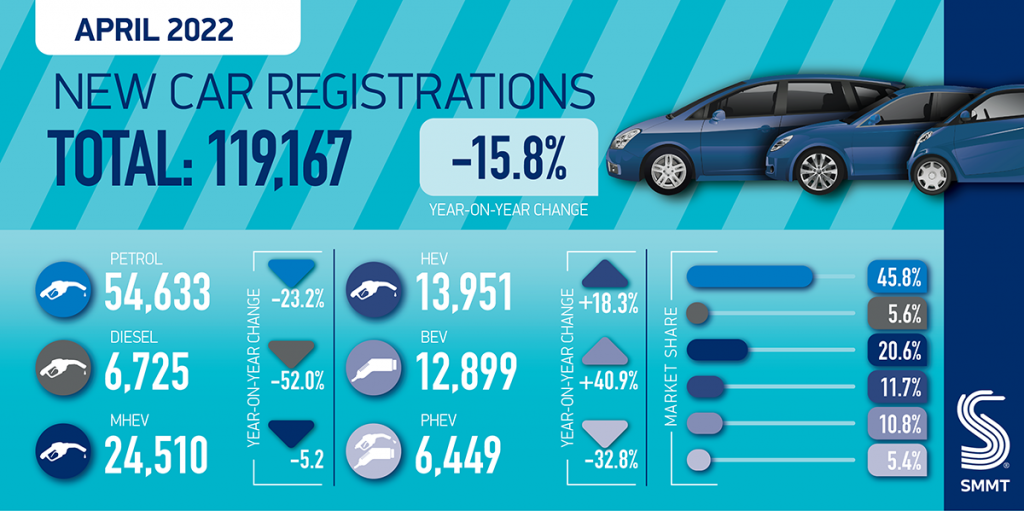Battery electric vehicle (BEV) registrations increased in April by 40.9% compared to the same month last year, despite the new car market facing a 15.8% decline, according to the latest figures from the Society of Motor Manufacturers and Traders (SMMT).
A total of 12,899 zero emission cars are joining UK roads, taking a 10.8% market share. Registrations of hybrid vehicles (HEVs) also rose by 18.3%.
But supply chain shortages, of which semi-conductors are the most notable, continued to constrain the delivery of new vehicles.
New car registrations in the UK fell to 119,167 units last month. The number of new plug-in hybrid (PHEV) registrations decreased by a third (-32.8%), resulting in electrified vehicles comprising 27.9% of all new car registrations in April.
Diesel and petrol vehicles also struggled. Registrations for diesel vehicles saw a decline of 51.4% compared to April 2021, while petrol-fuelled vehicle registrations dropped by 17.1%.
The SMMT, the trade association for the UK’s motor industry, has revised its market outlook for 2022, in response to these figures.
Mike Hawes, SMMT Chief Executive, said: “The worldwide semiconductor shortage continues to drag down the market, with global geopolitical issues threatening to undermine both supply and demand in the coming months.”
“Manufacturers are doing everything they can to deliver the latest low and zero emission vehicles, and those considering purchase should look to place their orders now to benefit from incentives, low interest rates and reduced running costs. Accelerating the transformation of the new car market and the carbon savings demanded of road transport in such difficult times requires not just the resolution of supply issues, however, but a broader package of measures that encourages customer demand and addresses obstacles, the biggest of which remains charging anxiety,” he said.
However, the compounding effects of the rise in the cost of living are expected to exacerbate the problem. Only 1.72 million new cars are expected to be registered during the year, down from the 1.89-million outlook in January. The outlook for plug-in vehicles is not much better, while the forecast for BEV registrations is now at 289,000 units, a decrease from 307,000. PHEVs are expected to be at 144,000, down from 163,000, while HEVs also saw their outlook fall from 198,000 to 193,000.
This means that plug-in electric cars are now expected to account for a quarter (or 25.2%) of all registrations during the year, with BEVs alone comprising around one in six new cars on the road.
The sector faces further economic strains, with rising inflation. Spiralling energy and fuel costs squeezing household incomes, and further supply chain and other uncertainties arising from the global political situation, as well as the Russian invasion of Ukraine, could pose further risks on the new car market.
But, more positively, interest rates remain historically low, therefore grants for BEVs will be in place until at least early 2023, and running costs associated with new electric cars are lower than those of petrol or diesel.
